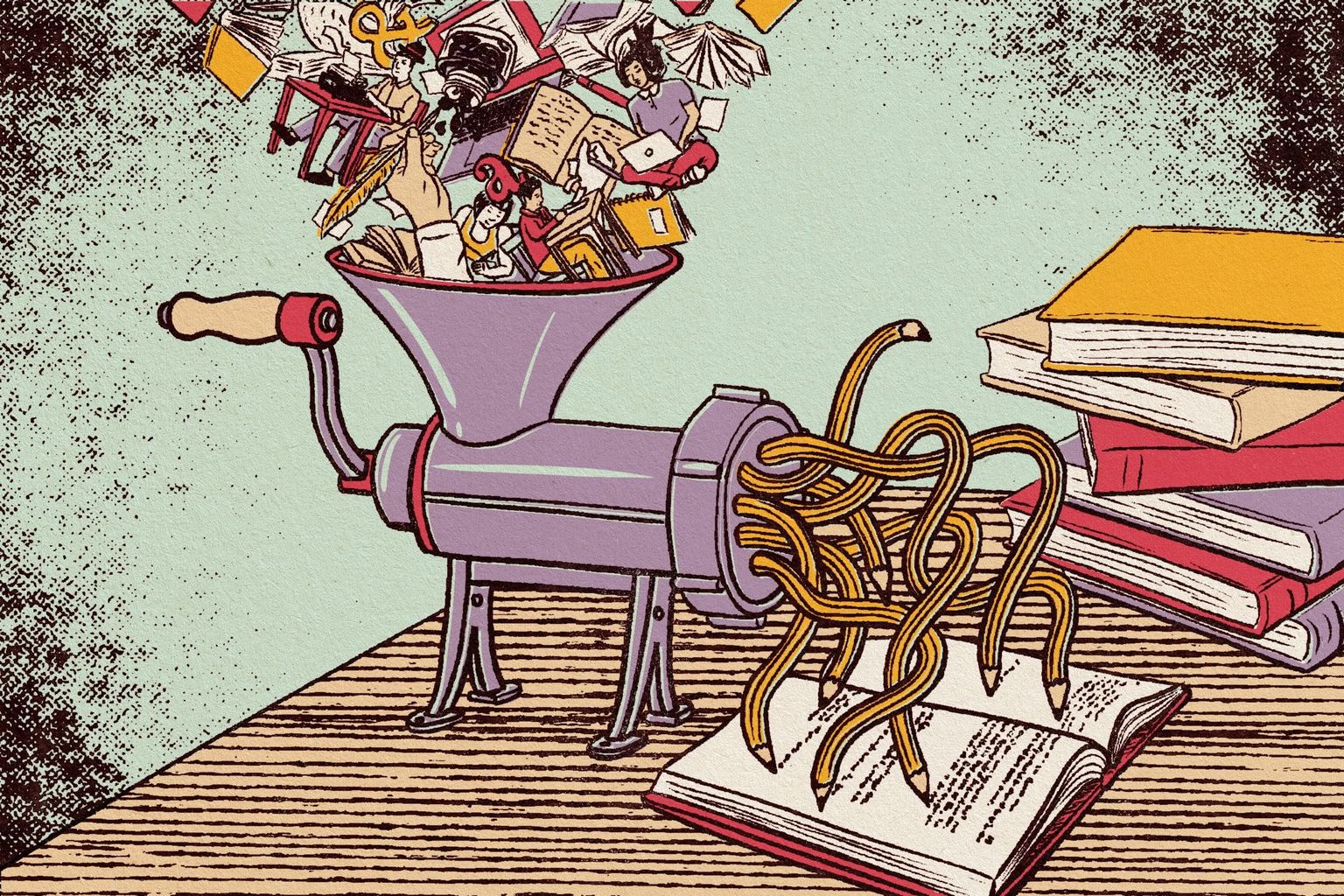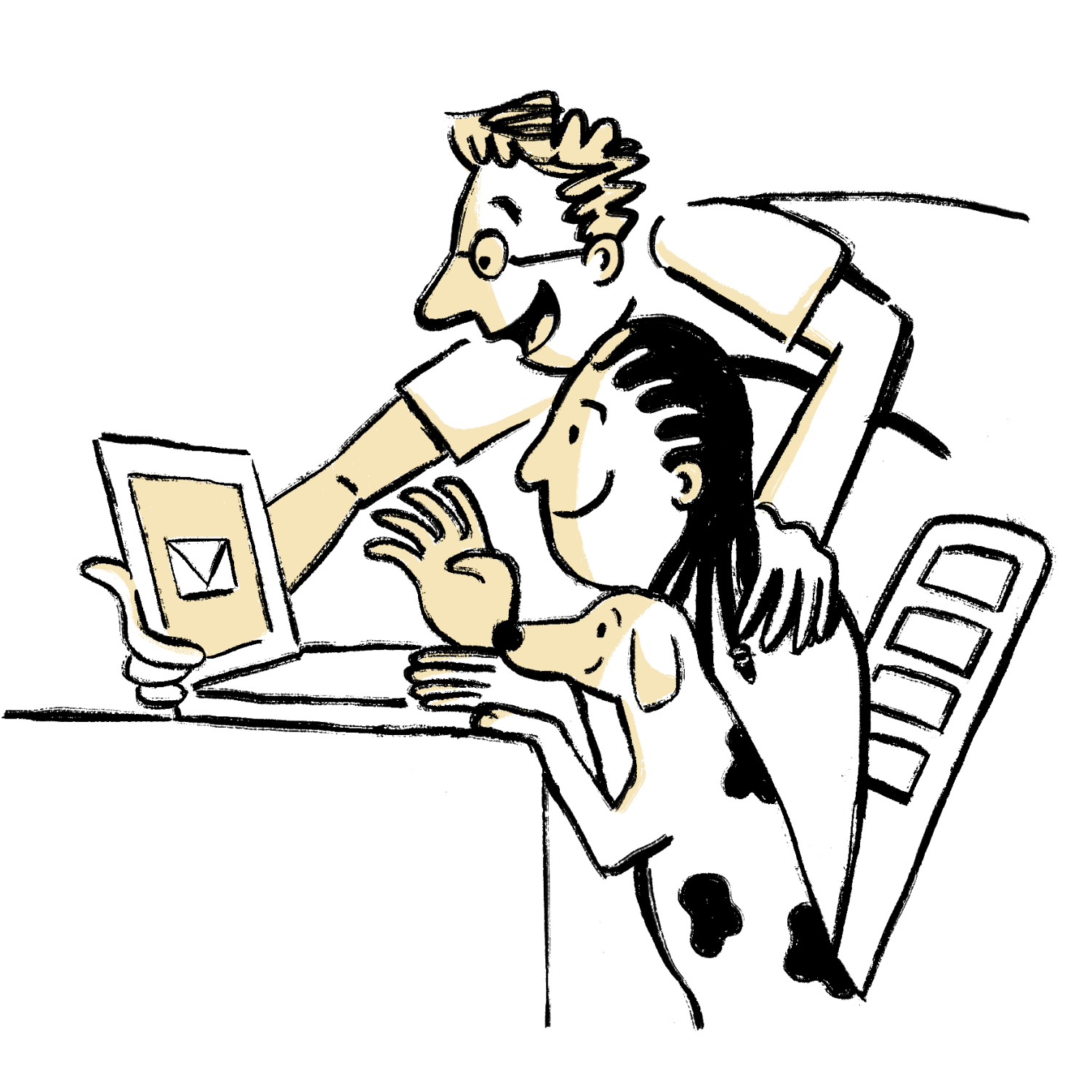They wanted to let AI write a novel. The backlash was fierce—and illuminating.
The group behind National Novel Writing Month, which challenges writers to pen 50,000 words each November, called opposing AI “classist and ableist”. Authors revolted—sparking debate about the very nature of creativity.

Illustration by Jarett Sitter
As August drew to a close, the organisation behind National Novel Writing Month (or #NaNoWriMo, if you prefer annoying hashtags) quietly released a statement about the use of artificial intelligence by participants gearing up for this year’s book-writing challenge.
Contrary to what you might expect from creatives celebrating the 25th anniversary of a tradition built around human expression and artistic community, the statement didn’t discourage authors from leaning on environmentally destructive, content-scraping technology to produce crappy fiction. Instead, they defended the right to do exactly that. “NaNoWriMo does not explicitly support any specific approach to writing,” the nonprofit stated, “nor does it explicitly condemn any approach, including the use of AI.” To do so, they said, would be “classist and ableist,” since “questions around the use of AI tie to questions around privilege”.
In a few sentences, an event meant to elevate amateur novelists through a commitment to craft betrayed that very cause, paving the way for chatbots to adopt the chore of writing.
This outburst of misguided allyship went viral, and not in the good way. The vast collective of NaNoWriMo writers, living up to their reputation for online drama, responded with a meltdown that touched every corner of social media. Past participants vented their anger; others vented their anger at those participants; several members of the NaNoWriMo writers board immediately resigned; sponsors began to retract their support. Scrambling to control the narrative, the organisation amended their disclosure twice, first to acknowledge “bad actors in the AI space,” and released a letter apologising for the comments about classism and ableism, which disappeared from the original policy language.
But its stance on AI remained fundamentally unchanged—and unpopular.
NaNoWriMo is hardly alone in its failure to resist the onslaught of AI culture. Plenty have stumbled in the same direction, with institutions from Marvel to Toys'R'Us to the Queensland Symphony Orchestra lambasted for favouring AI art above human talent. (That LinkedIn has copped relatively little flack for advising users to let AI write their posts probably says more about the cheerfully robotic style of that platform’s influencers.) But, in violating a similar taboo, NaNoWriMo courted a more intense backlash. The resulting discourse—a flurry of newspaper articles and invective-laden tweets—hinted at some deeper anxiety, rooted in the idea of novels as sacred, a final frontier of human creativity that AI must not breach. (Or as Ted Chiang argued in The New Yorker, could not breach.) What is it about the novel—this quaint medium that dates back barely a millennium—that makes it seemingly inviolable, while other AI incursions, while criticised, failed to inspire the same level of wrath?
A novel is, to paraphrase the writer Alexander Chee, an idea so large it takes an entire book to express.
Observed each November, NaNoWriMo asks authors to produce a 50,000-word novel draft in 30 short days. Call it an act of mutual inspiration, not unlike a marathon. In recent years, close to half a million have tried, and, on average, fewer than 20 per cent finish. No big deal: the deadline is a motivation, not a guarantee. Importantly, even those who don’t walk away with a novel are still working, sharing updates (via the ubiquitous hashtag) about the periods of hopeless block, the triumphant breakthroughs and all the mundane moments in between. Sure, everyone wants a stack of pages by the end—preferably nothing like Jack Torrance’s manuscript in The Shining—but with a united effort, these novelists make their hidden labor visible, a feat in itself.
This understanding of the project, I think, explains the blowback NaNoWriMo got after floating its case for the “ethical use” of AI. It’s not that AI has no conceivable application—discovering new medicines, for example, is about as valuable a use as one might imagine— it’s that every day we hear from smooth-brained futurists who think it can do everything. There are, honest to god, techbro mutants prepared to tell you with a straight face that a text-to-image model like Midjourney can improve on Picasso’s Guernica. To them, efficiency and optimisation are the goals—not feeling, thinking or, god forbid, doing. That is the principle NaNoWriMo now appears to endorse, and it’s no wonder the people who champion artistic struggle are offended.
The justification was also insulting to underprivileged, disabled and neurodivergent writers—who have long published extraordinary, ambitious, influential works of fiction—along with anyone brave enough to chain themselves to a desk as they do battle with the blank screen and blinking cursor. If the nonprofit wanted to sanction a dependence on LLMs, it needn’t hide behind the marginalised to do so. (Instead, it could bravely acknowledge that the AI-powered chatbot ProWritingAid is a sponsor.)
But the justification was also insulting to NaNoWriMo’s core constituents. The organisation did its faithful no favours by playing into an ugly stereotype: in the eyes of the publishing elite, the authors hashtagging their way to 50K words in November are hacks churning out formulaic young adult novels, genre pulp and erotic fanfiction. It doesn’t help these aspiring authors—already at a significant disadvantage—to be placed in the ‘AI fraud’ category, only a rung or two above ‘plagiarist’.
Instead of focusing on the potential harm to writers, the debate over NaNoWriMo's vague rule has centred on whether AI can compose a novel. In my estimation, this is not up for dispute. The large language models will gladly spit out sequential chapters according to your prescriptions for character, conflict, genre, style and resolution. They can probably do this to the satisfaction of the average James Patterson fan, and in marketplace terms, it doesn’t matter whether it ‘counts’ as art. Surely there’s a customer base for deceptive schlock generated by chatbots, because Amazon is riddled with it. (And profiting handsomely, no doubt.) But a sequence of 50,000 words does not a novel make.
A novel is, to paraphrase the writer Alexander Chee, an idea so large it takes an entire book to express. It isn’t built by padding a skeletal synopsis with tens of thousands of extra words; it’s the sum of discoveries, experiments, connections and transformations that arise from the human attempt to grasp that idea. With NaNoWriMo, this process has always been the focus, and that’s why a sudden indifference to craft struck the community as outright mission breach. NaNoWriMo is a virtual residency where all are invited to hone their skills together, and falling short is just a reason to try again (for what is an artistic life if not the pursuit of the unattainable?).
This has led the tech evangelists to regard themselves as masters of text-generating AI. In fact, it is the other way around.
Forget the tastes and expectations of readers. Forget the supposed capabilities of machine learning algorithms. Forget, even, the novel produced by the tortured author. These are incidental to what the writer derives from writing—the stretching of thought, a pleasure and pain accessible anywhere, from a mahogany-panelled library to a desert island to the line at the DMV. This is not to buy into the cliché of the lone inspired genius, or claim difficulty and deprivation as virtues in themselves; it is, rather, an invitation to consider how we came to entertain and confront ourselves with fantasies in the first place. It is our nature, and no doubt advantageous to the species, to imagine other worlds, other modes of existence.
The ways that fictions drift into a busy mind are miraculous. For some it is action and color, the blindingly clear picture. For others, the voice of a narrator begins composing a monologue, describing the nature of their trouble. From there, mapping out the plot can be helpful. But that path must be flexible, ready to break as you encounter—in the actual telling—unforeseen obstacles and new opportunities to enrich the work during the actual writing. Forging these paths, following them to the next fork, deciding which way to turn next—exploring the terrain as you map it—is not just the essence of literature. It is also how today’s writer leaps beyond the last.
AI makes these decisions for you, and it chooses from the limited past, so those who use it will never know the rewards of choosing yourself, nor the lessons taught by inevitable mistakes. The bot obeys the minimal pattern you set before it, without improvisation.
This has led the tech evangelists to regard themselves as masters of text-generating AI, which they compare to revolutionary tools like the printing press, typewriter and word-processing software. In fact, it is the other way around: the bots are constricting and flattening the potential contained in the smallest act of imagination. NaNoWriMo has, to their credit, belatedly acknowledged that having ChatGPT “write your entire novel would defeat the purpose of the challenge,” and it didn’t have to say any more than that. You’re not evading hours of senseless drudgery by enlisting a program to expand on your premise—you’re denying yourself the time to figure out why it matters to you.
